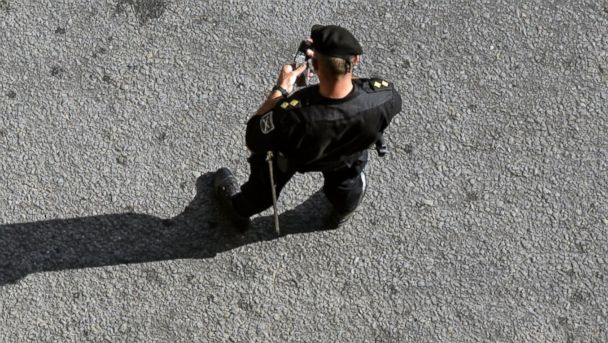Can Cops Search Your Cell Phone Without a Warrant?

(Daneil Caselli/AFP/Getty Images)
The founding fathers weren't exactly experts on issues like cloud storage, so Supreme Court justices often struggle with applying old, established rules to emerging technology.
On Tuesday, the high court will hear two cases that ask a variation of this question: Does a police officer need a warrant when searching a cell phone during a lawful arrest?
Lower courts have split on the issue. Courts upholding the warrantless searches have relied, at times, on a 1973 Supreme Court precedent that privacy advocates say doesn't contemplate modern technology. The search of a smart phone today can reveal much more than the last call dialed. Many devices contain videos, photographs, GPS information, cloud storage, financial documents and even a link to a webcam in a private home.
Peter A. Modafferi, chief of detectives at the district attorney's office in Rockland County, N.Y., is eager for some guidance from the court.
"Every cell phone at a crime scene is a really valuable piece of evidence, and now there is a cell phone at every crime scene," said Modafferi. He insisted that a "digital footprint" can be enormously helpful at an arrest and waiting for a warrant can be dangerous.
"You'd hate to seize a cell phone and put it in an evidence bag and only later find out there's a picture of a kidnapped kid on it," he said, adding that phones can be remotely wiped of information in a matter of seconds.
However, privacy advocates say there are ways of protecting the information on a cell phone, including securing the phone in a signal-blocking bag until a warrant is obtained.
One case the Supreme Court will hear on Tuesday involves a man named David Leon Riley. He was pulled over for driving a car with expired tags. When cops found concealed and loaded weapons in the car, they arrested Riley and seized his cell phone. One thing led to another and a warrantless search of the phone revealed photos and videos linking Riley to a recent gang shooting. Eventually, Riley received an extended sentence because of the gang link.
Riley's lawyer, Jeffrey L. Fisher of Stanford Law School, will tell the justices on Tuesday that the stakes in the debate are high.
"Americans use smart phones to generate and store a vast array of their most sensitive thoughts, communications and expressive material," he wrote in court briefs.
The second case before the court concerns a much simpler Verizon LG flip phone. The case involves Brima Wurie, a Boston man linked to a 2007 drug sale in the parking lot of the Lil Peach convenience store. After arrest, police noticed that Wurie's phone kept receiving an external call from a number identified as "my house" on the caller ID screen. The officers opened the phone and accessed its call number. Through a reverse directory they were able to obtain an associated address that eventually led them to get a warrant and find a stash of crack cocaine.
Wurie was ultimately sentenced to 262 months in prison.
But he appealed his sentence arguing that the cell phone information should be suppressed. A federal appeals court ruled in his favor. The court worried about the treasure trove of information available on a phone.
On Tuesday, the government will ask the Supreme Court to reverse the lower court ruling.
"In today's world, cell phones are particularly likely to contain evidence of unlawful activity and to help law-enforcement officers identify suspects they have apprehended," Solicitor General Donald B. Verrilli Jr. argued in court briefs.
"A reasonable search would extend to information on the phone that is reasonably related to the legitimate governmental objectives in discovering evidence of crime, identifying the arrestee, and protecting officers - but not to information that has no such connection," Verrilli said.
As the justices weigh privacy and technology, they will also have to consider the fact that there are approximately 12 million arrests a year, according to the FBI, and that 90 percent of Americans now carry a cell phone.